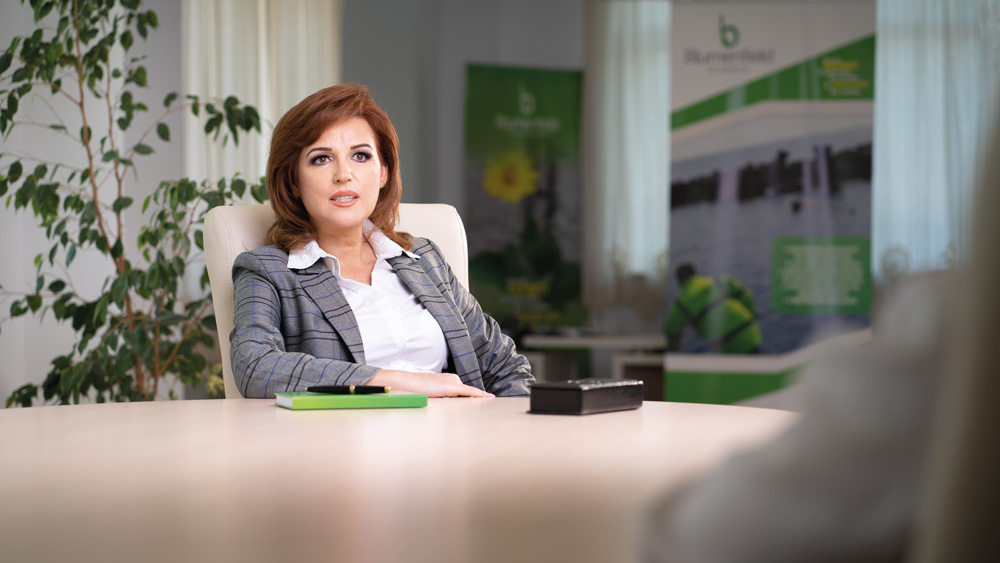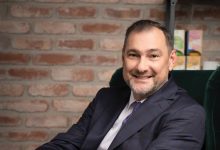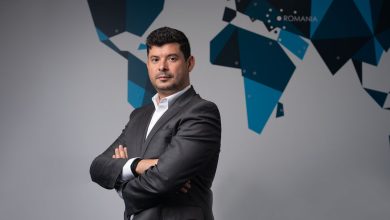Talking to Experts: Gabriela Stanciu, CEO Blumenfield
The Need for a Strategic Vision and Harmonization with EU Policies
This year, in May, the Ministry of Environment, Water and Forests issued an order approving the conditions for preparing environmental studies, the criteria for certification of natural and legal persons and the composition and the Regulation on the organization and functioning of the Certification Committee.
Gabriela Stanciu, CEO Blumenfield – a Romanian environmental consulting company, discusses about challenges faced by companies in Romania in order to align the Green Deal targets and clarifies some of the most important aspects relating to the activity of environmental consulting companies under Order No. 1134/2020 issued by the Ministry of Environment, Water and Forests.
In light of the European Green Deal, which includes policies aiming at climate neutrality by 2050, what are the challenges faced by companies in Romania in order to align to this desideratum?
Gabriela Stanciu: Clearly, a large part of Romanian energy companies has established as priority the fight against climate change and environmental degradation, in line with Romania’s desideratum assumed under the Green Deal policy. However, it is difficult to predict whether Romania will become climate neutral by 2050, given the current structure of the energy mix and the challenges faced by the domestic companies, especially in terms of endowment with performing, environmentally friendly equipment. For example, in this challenging period for the business environment, the necessities of the industry refer to transformation, digitization and retrofitting, and still, briefly put, they involve obtaining significant financing sources allowing the development of long-term investment strategies.
Fortunately, the energy industry, identified as one of the most polluting industries, benefits from the support of the relevant European bodies and thus becomes a priority objective for the competent national authorities. Specifically, I believe that the challenges of the Romanian industry refer to strategic vision and harmonization with EU policies regarding the development and streamlining of the entire operational circuit: production – transmission – distribution – supply.
How can advanced technologies change the rules in the field of environmental protection?
Gabriela Stanciu: As we know, globally we face important environmental problems, such as climate change, water and air pollution, impoverishment of natural resources and loss of biodiversity. Therefore, innovation and large-scale use of eco-technologies must keep up with the effects of climate change and pressure from anthropogenic activity on the Earth’s climate and ecosystems.
In this context, I would say that Romania provides great opportunities to make efficient the use of environmental technologies in the energy and transport sectors, and in particular in terms of waste and therefore wastewater management. Implementing environmentally friendly innovative solutions and technologies in these sectors provides possibilities for reducing energy consumption and emissions, recovering valuable by-products and reducing the volume of waste eliminated, as well as an efficient quantitative and qualitative wastewater treatment, thus contributing in a significant manner to the reduction of greenhouse gas emissions, as well as to the reduction of water eutrophication.
From the point of view of the environmental specialist, I can say however that eco-technologies do not refer only to investment strategies and business efficiency. Advanced environmental technologies are also used to monitor environmental factors, thus contributing to the collection of relevant data to identify the presence of pollutants and set efficient remediation measures. Endowment of environmental laboratories with performing analysis equipment and technologies is a key requirement in delivering concrete, qualitative results. Specialized human resources are again a defining factor. Specifically, for an environmental laboratory to permanently ensure qualitative results, it involves both advanced technologies and professionals with training in various areas of activity: chemistry, physics, biology, ecology.
The challenge is to identify qualified personnel, with potential, to ensure a continuous professional development and create a sustainable business environment to support these specialists in their efforts to protect the environment.
Europe monitors the factors that lead to lower biodiversity, through measures for fighting soil and water pollution, as well as a new forest strategy. What is the situation in Romania from this point of view? What can you tell us about the management of projects with environmental impact that you deal with?
Gabriela Stanciu: Pollution always has a source and at least one direct effect.
The problem occurs when the level of soil, water or air pollution exceeds the limit that the ecosystem can absorb, causing a significant reduction of habitats and consequently the diminishing of biodiversity, or, even worse, losing it. Forests are habitats for many species of fauna and flora, and ecologically contribute to soil protection, reduce desertification, but especially participate in the water circuit in nature and balance the climate through processes such as evapotranspiration, carbon dioxide capture and oxygen release.
As such, protecting these environmental components is a desideratum at both European and national level. European directives on habitats, water, air, pollution reduction etc. transposed into the specific Romanian legislation, together with the national environmental strategies and policies, provide the legal framework for ensuring the protection of the environment/of these components.
However, an important factor in environmental protection is also the assessment of the potential impact generated by certain projects by performing concrete studies on the initial state of the environment and, at the same time, monitoring the effects of the environmental components on activities with significant impact.
Blumenfield®, as a developer of environmental studies certified by the Ministry of Environment, has the methodological support of its scientific division, Blumenfield Science, which is in fact a private research center for environmental protection. Therefore, assessing the initial state of the environment on the site of the proposed projects, as well as assessing the effects of economic activities, are carried out by laboratory analysis of water, soil, sediment, waste samples, air and noise level measurement, as well as monitoring of terrestrial and marine biodiversity.
Conducting these complex studies is necessary for a relevant assessment of the potential impact of projects, as well as to establish efficient and relevant programs to monitor the environmental factors that can be affected by the implementation of projects and development of activities.
This is important for two reasons.
First, for a better knowledge of the ecological state of environmental components on the site of the objectives proposed for development and a correct assessment of their environmental impact.
Secondly, to optimize potential future costs, recorded with landscaping and environmental protection projects. Given that it is concretely known which environmental factor is affected and to what extent it is impacted, you can intervene and monitor the effects on it punctually, without a consumption of resources allocated to segments that do not require protection.
Regarding our environmental projects, I can claim that they have been successfully implemented, Blumenfield specialists being able to provide correct solutions, which have always benefited the environment, of course with the support of our partners – companies from various economic sectors, which understood the need to contribute to an unpolluted environment.
In this way, Black Sea and onshore gas exploration projects, projects for the operation of wind farms, the exploitation of mineral resources, infrastructure and real estate development projects, activities with significant environmental impact that require integrated environmental permits have been and are efficiently managed in terms of environmental protection by Blumenfield team.
Ensuring integrated environmental services for drilling Black Sea gas exploration wells was one of the difficult projects, which required our complex experience, starting from the stage of permits and approvals to the implementation of environmental protection conditions, waste management and monitoring of the marine ecosystem.
We are proud that one of the largest geophysical data acquisition projects for gas prospecting in Europe and automatically in Romania, implemented over more than 1,600 km2, on the administrative area of three counties (Braila, Buzau, Ialomita) benefited from consulting and environmental studies from us, at this moment being involved in another similar project, in the stage of obtaining the environmental regulatory acts.
To the same extent, companies in the green energy sector currently use Blumenfield expertise for biodiversity monitoring studies and the draw up of environmental impact assessment studies for the development and operation of wind parks.
What are the most important milestones of Order no. 1134/2020 issued by the Ministry of Environment and how do they influence the activity of consulting companies in the environmental field? How can professional competence be ensured in this field?
Gabriela Stanciu: The professional competence of consulting companies in drawing up environmental studies was regulated until May this year by Order of the Ministry of Environment no. 1026/2009. Based on this order, legal persons were certified to draw up environmental studies (environmental impact assessment reports, adequate assessment studies, environmental balance sheets, site reports, security reports etc.) based on the professional training of the personnel, but without having a distinction between them, depending on the proven experience of the team.
The new regulation, i.e. Order No. 1134/2020, gives the possibility to legal entities to obtain the certificate of developer of environmental studies strictly on the fields and degree of certification (principal or assistant) of experts employed for an indefinite period or under collaboration contract within the respective entity. Moreover, changing the composition of the team, based on which the certification was received, will automatically lead to changes in the level and field of certification of the legal entity.
It is a substantive change regarding the professional competence of developer of environmental studies, the purpose that I intuit being to create a more rigorous and legally regulated specialization in the environmental consulting market.
Therefore, a healthy competitive environment is created, whose beneficiaries are in the end the companies that need specialized environmental consulting services at a high-performance level, adapted to the real needs.
Last but not least, I believe that it was necessary to create an adequate and regulated professional framework, based on which to offer conditions of professional development for the graduates of profile faculties, and also to facilitate the exchange of experience and continuous professional training, given the fact that we are living in a time of dynamic changes, automatically in the professional environment as well.
According to a report recently published by the European Environmental Agency (which analyzes the period 1990-2018), Romania is one of the cleanest countries in the European Union. However, while in the industrialized countries the reduction of polluting emissions came as an effect of environmental investments starting with 1990, in Romania it is the effect of the deindustrialization process. The EU statistics show that for each euro produced in Romania 569 grams of CO2e are emitted, one of the largest quantities in the Community space, although, after Germany and the UK, our country recorded the largest reduction in pollution after 1990. In other words, we pollute a lot to produce little. From the perspective of an environmental specialist, how do you think things could be improved?
Gabriela Stanciu: The fact that Romania is one of the cleanest countries in the European Union, but at the same time production not being at the same level as that of the developed countries, should not give us a comfort zone. On the contrary, although according to statistics Romania is evaluated as a ‘clean’ country as compared to other EU countries, we all notice in the day-to-day life that there are many areas that require significant improvement. Here, it is necessary to actively involve everyone to ensure environmental protection and the future of the following generations, from national policies, strategies of corporations, projects of small companies, and also the individual behavior, of each of us.
The situation could be improved, taking the example of strongly industrialized states, which managed to reduce CO2 emissions over the past few years. Following closely their policies and strategies and complying with the rules applied by them, Romania can develop and align to EU standards.
As a first step, I believe there should be a correct identification of the deindustrialization factors, such as an aging workforce, declining demand for industrial products, the outsourcing of production to emerging economies or the lack of qualified personnel. After identifying them, the industrial sector can reopen and expand complying with the European standards and regulations.
Reducing the gap on these CO2 emissions, compared to massively industrialized countries, is a goal that we must assume at national level. It is encouraging and I welcome the significant reduction in pollution, but more is obviously needed. This trend must be confirmed as a constant one and this can be achieved through coherent environmental policies, adapted to the current realities, which will definitely provide the necessary space for technology and digitalization of industries.
How is Blumenfield going through this period of crisis caused by the Covid-19 pandemic and how do you see the return to the level of activity, prior to the period of crisis – productivity/economic performance?
Gabriela Stanciu: It is a difficult period for all of us, marked by a state of uncertainty that we each feel more or less, according to the degree of adaptation to restrictive conditions regarding the social life and implicitly all activities.
Blumenfield® has since its inception an integrated management system implemented in safe work procedures for employees, and Blumenfield Science Environmental Laboratories are typically workspaces with restricted access for outsiders and controlled in terms of pathogens or contaminants.
Therefore, the personnel are trained to work in permanent safety, both in the laboratory and during field trips and sampling; at the same time, the workspaces are sterilized daily, using UV lamps, and at regular intervals the surfaces are wiped with disinfectant solutions, all for the protection and safety of the personnel and their families.
Putting aside the need to support the business environment through concrete government programs, my opinion is that companies’ management have understood that they need to look beyond the crisis and set up their own recovery plans and… why not, plans for the future investment.







